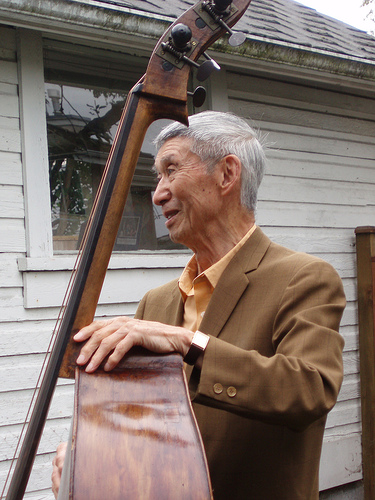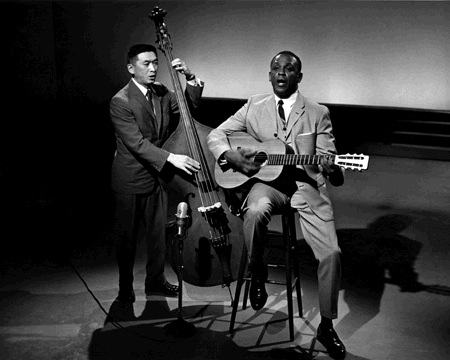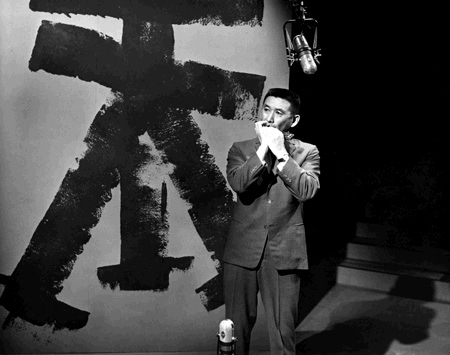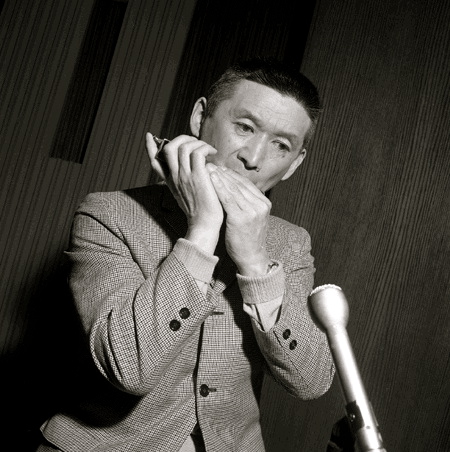ARTIST

Aoki, Harry
"Jazz is a very misleading word sometimes, you know."INSTRUMENTS Harmonica, Composer/Arranger, Bass
VENUE CBC Vancouver
"Even today, people ask me what I like to listen to, what I like to play. I say, whatever I'm doing, whatever I'm listening to."
-Harry Aoki
Harry Aoki is a pioneer of world music in Vancouver. Son of a Japanese Zen Buddhist record collector who equally enjoyed listening to J.S. Bach and Duke Ellington, Aoki fell in love with the double bass in the early 1940s when he saw Jimmy Blanton playing it with the Duke Ellington Orchestra at the Horse Show Building in Hastings Park, Vancouver. While attending Britannia High School, Aoki met a couple of fellows who also shared an interest in jazz. Around the same time, Aoki became aware of Japanese music, which he recalls sounded "pretty weird." At first he thought it was "dissonant" in comparison to Ellington's big band and the classical sounds of Bach.
"Some other cultures are sort of reluctant to mix with others, and I'd like to say, 'Look, there's nothing to fear. Nobody's going to steal it. Nobody's going to get better at you at what you're doing.' That's not the point."
-Harry Aoki
Harry Aoki's music draws upon influences from cultures across the globe. For example, one of his pieces is based on a Tagore poem (India) and combines a Shinto spiritual (Japan) with a Celtic lament (Ireland) "until you can't tell the difference," he smiles. In the 1960s, Aoki was a familiar face at the CBC Vancouver studios with other regulars such as Doug Parker and Don Thompson. Together with guitarist/singer Jim Johnson, Aoki co-hosted a weekly CBC TV series called Moods of Man (1965) featuring a wide range of music including folk, blues, and classical selections. Aoki also collaborated with vibraphonist/pianist Elmer Gill, a "tremendous musician" who once sketched out a jazz adaptation of Bach's Invention in D Minor during a ferry ride to a concert in Victoria, BC.
"He called it 'haiku jazz.'"
-Harry Aoki
One night, while performing with Elmer Gill at the London hotspot Ronnie Scott's, Aoki played the well-known jazz standard "It Might As Well Be Spring" not knowing at the time that he was about to open up a whole new understanding of himself as a musician:
I was trying to hit the notes not dead-on but just a little bit off. Just sticking with the melody. And at the very end, just for 3 or 4 bars, I put a little ending on it--almost like a calligraphy. Like Haiku, you know? And this critic picked up on that. He called it 'haiku jazz.'
Harry Aoki was the music director of the first ever Commonwealth Games in Edmonton (1978) where he connected with great music figures including Senator Tommy Banks and composer George Koehler. Presently, Aoki continues to host the First Friday Forum, an outreach program focusing on the theme of culture and identity with the objective of sharing experience through music and dialogue. When it comes to communication, "Music is one of the easiest ways to do it," Aoki explains. "[When] you're dealing with the arts, "you're dealing with the best part of the person."
-Harry Aoki
Harry Aoki is a pioneer of world music in Vancouver. Son of a Japanese Zen Buddhist record collector who equally enjoyed listening to J.S. Bach and Duke Ellington, Aoki fell in love with the double bass in the early 1940s when he saw Jimmy Blanton playing it with the Duke Ellington Orchestra at the Horse Show Building in Hastings Park, Vancouver. While attending Britannia High School, Aoki met a couple of fellows who also shared an interest in jazz. Around the same time, Aoki became aware of Japanese music, which he recalls sounded "pretty weird." At first he thought it was "dissonant" in comparison to Ellington's big band and the classical sounds of Bach.
"Some other cultures are sort of reluctant to mix with others, and I'd like to say, 'Look, there's nothing to fear. Nobody's going to steal it. Nobody's going to get better at you at what you're doing.' That's not the point."
-Harry Aoki
Harry Aoki's music draws upon influences from cultures across the globe. For example, one of his pieces is based on a Tagore poem (India) and combines a Shinto spiritual (Japan) with a Celtic lament (Ireland) "until you can't tell the difference," he smiles. In the 1960s, Aoki was a familiar face at the CBC Vancouver studios with other regulars such as Doug Parker and Don Thompson. Together with guitarist/singer Jim Johnson, Aoki co-hosted a weekly CBC TV series called Moods of Man (1965) featuring a wide range of music including folk, blues, and classical selections. Aoki also collaborated with vibraphonist/pianist Elmer Gill, a "tremendous musician" who once sketched out a jazz adaptation of Bach's Invention in D Minor during a ferry ride to a concert in Victoria, BC.
"He called it 'haiku jazz.'"
-Harry Aoki
One night, while performing with Elmer Gill at the London hotspot Ronnie Scott's, Aoki played the well-known jazz standard "It Might As Well Be Spring" not knowing at the time that he was about to open up a whole new understanding of himself as a musician:
I was trying to hit the notes not dead-on but just a little bit off. Just sticking with the melody. And at the very end, just for 3 or 4 bars, I put a little ending on it--almost like a calligraphy. Like Haiku, you know? And this critic picked up on that. He called it 'haiku jazz.'
Harry Aoki was the music director of the first ever Commonwealth Games in Edmonton (1978) where he connected with great music figures including Senator Tommy Banks and composer George Koehler. Presently, Aoki continues to host the First Friday Forum, an outreach program focusing on the theme of culture and identity with the objective of sharing experience through music and dialogue. When it comes to communication, "Music is one of the easiest ways to do it," Aoki explains. "[When] you're dealing with the arts, "you're dealing with the best part of the person."
PHOTO GALLERY
Click on thumbnail for larger image
VIDEO
Harry Aoki - haiku jazz
Harry Aoki - 1942 internment; how he started playing bass
Harry Aoki - back to Vancouver and meeting Jim Johnson
Harry Aoki - mixing of different cultures
BIBLIOGRAPHY
JazzStreet Vancouver Interview
Aoki, Harry. Personal Interview with Alan Matheson. Vancouver, BC. 02 Aug 2006.
FOR MORE INFO
Japanese Internment (1942)Read about a shameful period in Canadian history that affected many Japanese-Canadians including Harry Aoki.
Nikkei Place
see "First Friday Forum"











